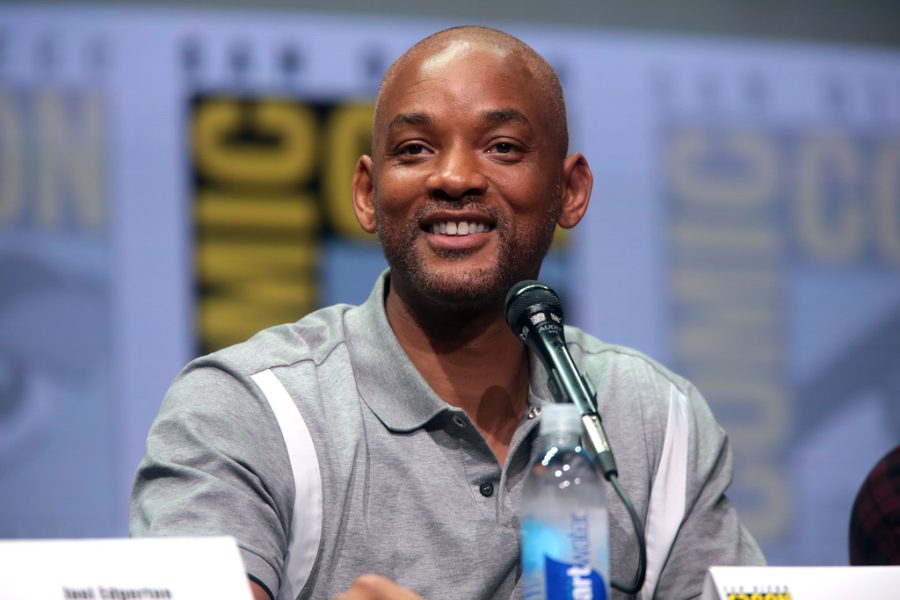How did Will Smith’s Oscars slap impact gender inequality?
Will Smith speaks at the 2017 San Diego Comic Con.
April 1, 2022
While we here at The Lasso can contribute our fair share of ditzy celebrity opinions, I thought the most recent celeb headlines might call for a more serious piece. The Chris Rock/Will Smith controversy, while outlandish and rather funny, is representative of larger cultural issues that need to be addressed.
If you’re not caught up, Chris Rock poked fun at Jada Pinkett Smith’s shaved head at the Oscars on Sunday night. Though Will Smith, her husband, originally laughed, he saw that his wife was upset and proceeded to walk onto the stage and slap (or hit?) Rock. He then screamed at Rock to keep his wife’s name out of his mouth. (Give or take.) Awkward silence filled the room of thousands until Rock announced the nominees of the next category.
I’ve mulled over who to “side with,” though I think that creating sides is inherently problematic in this situation. By siding with Rock, it can be implied that you’re supporting his joke. And by siding with Smith, it can be concluded that you’re pro-slap. I would say I’m against both!
While award show presenters are reveled for their ability to connect with the audience at others’ expense, (see: Ricky Gervais, Tina Fey, Amy Poehler), quips at a woman’s autoimmune disorder aren’t appropriate. Pinkett Smith has discussed her struggles with alopecia openly, so it felt even colder. Though I felt very off at Rock’s comment, it was the reaction to Will Smith’s actions that made me pause. He literally hit someone in the face, and people in the audience could be heard clapping!
Tiffany Haddish relayed her support of Will Smith’s actions to PEOPLE. “And maybe the world might not like how it went down, but for me, it was the most beautiful thing I’ve ever seen because it made me believe that there are still men out there that love and care about their women, their wives.”
Uhhhhh gross. Why is this cultural trope, that a man has a responsibility to “protect” his wife, being reinforced? Especially without her consent. The entire narrative is spurring forward toxic masculinity, putting a weird and unnecessary burden on men, while also disallowing women from deciding how to handle situations in which they’re targeted — that have nothing to do with their husbands.
There is also the blaring aspect of this situation that must be considered — how involved even were Jada’s feelings? It would not be surprising, given traditional gender roles, if Smith was acting violently due to someone he was associated with being publicly humiliated. The Smith family name was attacked, so Smith stepped in. That is why the concept of male protection is so negatively nuanced — men are not only conditioned to think that they must act violently when their masculinity is challenged, but are conditioned to think that insults to people they are associated with poorly reflects on their masculinity.
It is up to men, and parents raising their children, to learn how to break down these barriers and outside pressures to act this way. Gender inequality is not a societal aspect that only negatively reflects women. We know this, but continue to hold on to so much poor messaging to men on what masculinity is.
Also, the line “there are still men that love and care about their women, their wives” from Haddish is so contradictory to modern relationship standards. Love should not be defined by how quickly a man jumps in to defend his wife in her name, but how unabashedly he supports her decisions.
While the waves of feminism ebb and flow, current society can claim to be riding a high. But this congratulations to Will Smith is such a shocking upturn in gender imbalance.
Smith could have touched his wife’s arm or squeezed her hand, and allowed her the ability to later send out a tweet or write an essay or make some sort of statement in which she held the spotlight. Instead, he took that away from her and created a violent situation out of a verbal attack. It was weak, thoughtless, dramatic, controlling, and should not in any way be glorified.
Though Pinkett Smith didn’t do anything wrong, the praise of Smith’s actions sends the message that they were acceptable, when he should never be thought of as the aspiration in this situation.
And I hope, to all the girls out there, you don’t turn to your father or brother or boyfriend when you’re insulted. You don’t expect them to declare war in your honor. I hope you take their support and act for yourself.










Ally Campbell • Apr 4, 2022 at 2:07 PM
I love this article. It addresses a very important impact of this event that is not nearly spoken about enough.